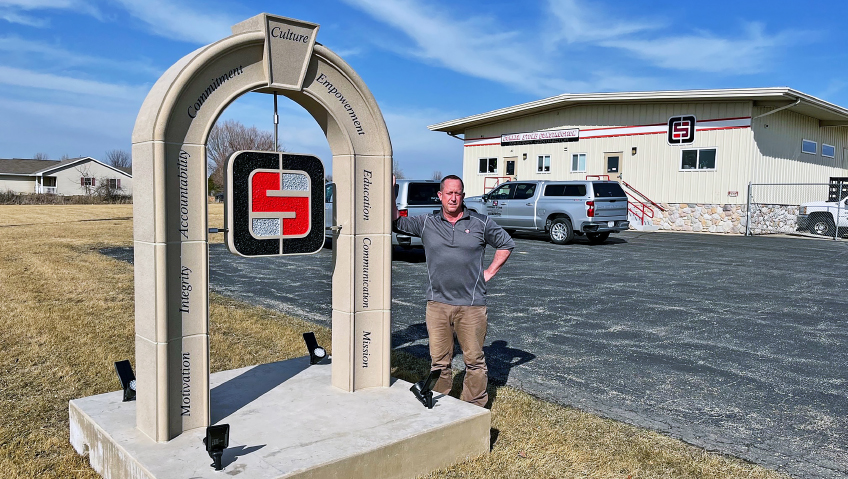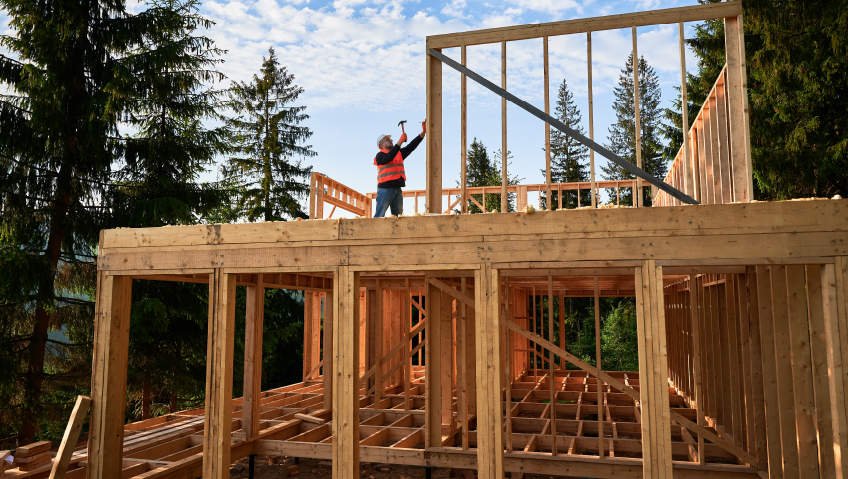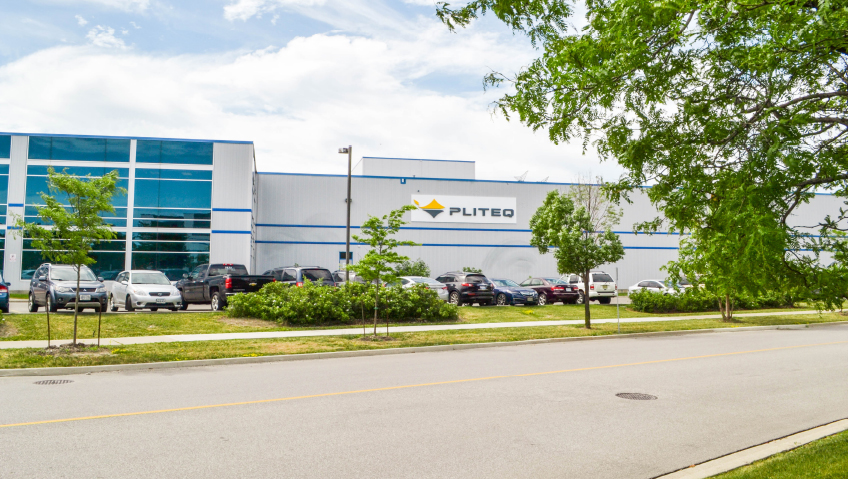Corner Stone Construction is a commercial masonry firm based in Janesville, Wisconsin that practices a growth strategy based on known strengths, a highly focused service offering, and quality work.
The firm uses bricks, mortar, stone, and other materials to build schools, shopping malls, sport stadiums, and more. “We strictly do masonry. We don’t do concrete. We stick with what we know and what we’re good at,” says Jeff Staver, President and Chief Executive Officer, and son of the company’s founder. Given that it marked its 40th anniversary this year, the company has been well-served by this deliberate approach.
Corner Stone’s enduring success is due to “smart growth” and “good estimating,” Staver says. By the former, he means “not taking on projects that are over your head and staying within your capabilities. Staying within our work region is another, where we know the way the market works. I think a lot of that has contributed to our success.”
While Corner Stone has occasionally ventured into northern Illinois, most of the company’s work is done within its home state, and precise estimating helps it remain profitable.
“Every project has a certain amount of risk involved with it—whether it’s the site logistics or maybe it’s the height of the building,” says Staver. “Those are all things you have to price accordingly. Sometimes, you price yourself out of a job, but if we can’t do it at our cost, we look at it as not worth doing. We trust our costs. We don’t pay attention to what other people’s costs are.”
Hands-on involvement is also key to Corner Stone Construction’s longevity. “As owner, I’m very involved in the day-to-day operations of the company. Instead of delegating a lot of the responsibility to everybody, I’m the project manager,” he states.
Corner Stone has approximately 55 employees—a number that can go up to 80 in the busy summer season. It is also a union contractor, with workers belonging to the Bricklayers and Allied Craftworkers.
The company has built a team of employees who are ethical, hard-working, and have a “good attitude,” says Staver, adding that common sense is another sought after trait in new personnel, as Corner Stone is very safety-focused. “I’m one of the few masonry subcontractors around here that has a full-time safety director—a real one, that’s gone to school and been trained for it,” he says.
Mike Bales, Corner Stone’s Safety Director/Operations Director, graduated from Eastern Kentucky University with a degree in Occupational Safety and is in his 16th year of working in safety. Bales regularly inspects worksites and performs safety audits, complete with photographs. Workers file daily paperwork identifying hazards they expect to face on their shift, and the company erects its own scaffolding, which is carefully inspected before and after each job, hosts weekly toolbox meetings, and encourages open communication and continuous improvement.
“We stress to our people that we want to hear about near-miss incidents. We want these reported even if nobody got hurt,” Staver explains.
Clearly, the company has found a successful strategy, as the firm took a first-place finish in the 2024 Construction Safety Excellence Awards conferred by the Associated General Contractors of America (AGC). It won this national-level award in March of this year based on its safety performance in the under 175,000 man-hour-per-year category.
In addition to being committed to safety and quality, Corner Stone takes its workplace culture very seriously. The company uses a picture of a stone arch to depict its values, with the stones in the archway marked with values such as accountability, motivation, integrity, communication, and empowerment. The stone at the top of the arch is marked, simply, ‘culture.’ “Our culture is the top keystone that holds that arch together,” explains Bales.
Corner Stone has a leadership team that is not only expected to lead and inspire but to set the pace and act as experts. “We find, in a lot of situations, our masonry superintendents are more knowledgeable than the superintendents on the jobsite. We’re very fortunate to have some really well-trained leaders in our group,” says Staver.
Likewise, he greatly appreciates his workforce. “We can’t be the company we can be without their hard work and their dedication to safety and quality and production. Those guys are out there working on days when it’s five below zero or 98 degrees out. [We take] our hats off to these guys,” he states.
Corner Stone was founded in 1984 by David Staver (Jeff’s father) who has since retired. From the start, the business centered on masonry. By not overextending itself in terms of services or market reach, the company avoided the pitfalls that can plague businesses with ambitions that outstrip their capabilities. In a similar fashion, it has weathered economic downturns that devastated other companies.
“I don’t think we really had any struggles,” Staver shares. “We’re proud to say we made it through the market crash in 2008 to 2009 when construction basically went to a halt. We were still able to have a few profitable years there; even though it wasn’t what we were used to, we were still able to move forward.”
This forward progression stemmed in part from the company’s willingness to “say ‘no’ to a lot of projects back then, to not dig ourselves into a hole,” he explains.
COVID did affect the firm, as it did every company in North America, but Corner Stone simply adjusted and continued to maintain an even keel. “We just followed government protocols. We had masks on our people,” recalls Staver. “Fortunately, we got through it.”
Over the decades, Corner Stone has been involved in several high-level projects, including a minor league sport stadium in Beloit, Wisconsin. Officially called ABC Supply Stadium, this beautiful ballpark boasts a reddish brick façade with graceful arches. The company won an Excellence in Clay Masonry Award for 2022 from the Wisconsin Masonry Alliance (WMA) for its efforts.
“It looks like a small professional stadium. It was a really neat project,” says Staver. “We’ve done so many large projects—airports, hospitals, schools, corporate offices, industrial, wastewater treatment plants. We just finished a $7 million school renovation at Madison West High School. There aren’t many projects we can’t take on.”
That said, Corner Stone does not do residential work and can be picky about other assignments, wary of working on very tall buildings in crowded urban areas, particularly if such jobs entail the use of tower cranes to hoist supplies and parts.
“We’re pretty careful about how we approach those projects from a pricing standpoint, because we’re not always in control of things such as access to a tower crane,” Staver explains. “[Sometimes] you have to share it with other trades. Anywhere with a large density where you go high, those are the [projects] we are most cautious about,” he says.
The company takes this mindful approach in everything it does. The team doesn’t do much promotion per se, relying instead on its reputation to generate business. “When we tell you we’re going to do something, we do it; we don’t show up a day later. We don’t miss schedules. We’re really known in the industry for getting things done fast, while not taking any shortcuts.”
In contrast to its minimal marketing efforts, Corner Stone is heavily involved with charitable and community initiatives. The firm is a strong backer of a charity called Logan’s Heart and Smiles, which retrofits homes to better accommodate children with disabilities. It also supports a Madison, Wisconsin residence called the Goodman Community Center that offers shelter to vulnerable populations. “It’s not a handout,” says Staver. “They’ve got young adults in there learning how to cook and cater, performing services and things like that. We’re proud to be part of that as well,” he notes.
In another initiative close to home, Corner Stone regularly takes part in an annual event called Kids Building Wisconsin, which aims to educate children about construction. In previous years, kids constructed brick wall mock-ups with lime-based mortar. In more recent years, the company has erected hydraulic scaffolding for boys and girls to climb on, eventually exiting at an assortment of playground equipment.
Staver says it can be difficult to find and retain skilled workers. It is not a unique problem; across North America skilled tradespeople are nearing retirement age and not enough young people are stepping up to replace them. Still, he is optimistic.
“We definitely have goals,” he says. “Our goals are to continue to be safe. Growth hasn’t always been a huge goal, as long as we’re profitable. It’s a matter of picking the right projects throughout the year.” And at present, there are no plans to diversify and risk diluting the formula that made the company so successful. “We’re going to stick with masonry.”






